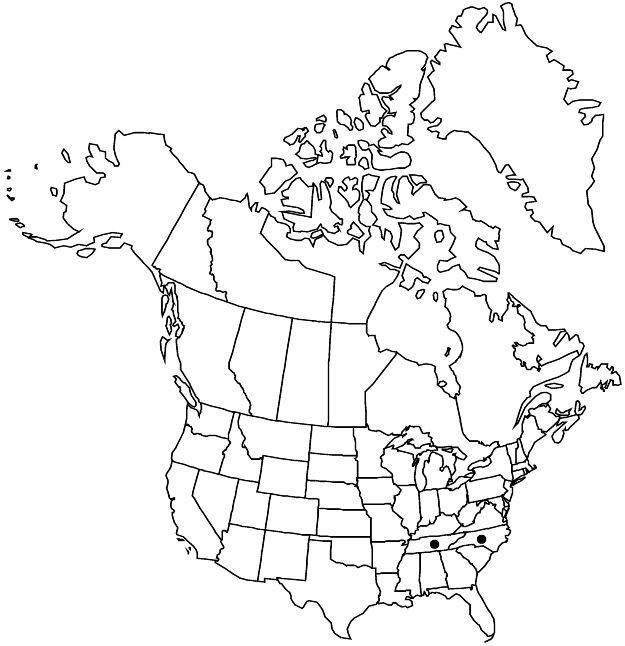Difference between revisions of "Geum radiatum"
Fl. Bor.-Amer. 1: 300. 1803.
FNA>Volume Importer |
imported>Volume Importer |
||
| (6 intermediate revisions by 2 users not shown) | |||
| Line 19: | Line 19: | ||
|name=Sieversia radiata | |name=Sieversia radiata | ||
|authority=(Michaux) G. Don | |authority=(Michaux) G. Don | ||
| + | |rank=species | ||
}} | }} | ||
|hierarchy=Rosaceae;Rosaceae subfam. Rosoideae;Rosaceae tribe Colurieae;Geum;Geum radiatum | |hierarchy=Rosaceae;Rosaceae subfam. Rosoideae;Rosaceae tribe Colurieae;Geum;Geum radiatum | ||
| Line 35: | Line 36: | ||
|distribution=N.C.;Tenn. | |distribution=N.C.;Tenn. | ||
|discussion=<p>Of conservation concern.</p><!-- | |discussion=<p>Of conservation concern.</p><!-- | ||
| − | --><p>Geum radiatum is closely related to G. calthifolium and G. peckii. The morphologic differences among them are slight compared to the discontinuities separating other Geum species. On the basis of morphology it would be possible to combine all three in a single species. Yet they occupy distinct ranges separated by a minimum of 1200 km. Traditionally, they have been treated as separate species, and recently I. G. Paterson and M. Snyder (1999) reported molecular genetic evidence for continuing to recognize G. peckii and G. radiatum as separate species.</p><!-- | + | --><p><i>Geum radiatum</i> is closely related to <i>G. calthifolium</i> and <i>G. peckii</i>. The morphologic differences among them are slight compared to the discontinuities separating other <i>Geum</i> species. On the basis of morphology it would be possible to combine all three in a single species. Yet they occupy distinct ranges separated by a minimum of 1200 km. Traditionally, they have been treated as separate species, and recently I. G. Paterson and M. Snyder (1999) reported molecular genetic evidence for continuing to recognize <i>G. peckii</i> and <i>G. radiatum</i> as separate species.</p><!-- |
| − | --><p>Geum radiatum is listed as an endangered species by the U.S. Fish and Wildlife Service.</p> | + | --><p><i>Geum radiatum</i> is listed as an endangered species by the U.S. Fish and Wildlife Service.</p> |
|tables= | |tables= | ||
|references= | |references= | ||
| Line 45: | Line 46: | ||
-->{{#Taxon: | -->{{#Taxon: | ||
name=Geum radiatum | name=Geum radiatum | ||
| − | |||
|authority=Michaux | |authority=Michaux | ||
|rank=species | |rank=species | ||
| Line 60: | Line 60: | ||
|publication year=1803 | |publication year=1803 | ||
|special status=Conservation concern;Endemic | |special status=Conservation concern;Endemic | ||
| − | |source xml=https:// | + | |source xml=https://bitbucket.org/aafc-mbb/fna-data-curation/src/2e0870ddd59836b60bcf96646a41e87ea5a5943a/coarse_grained_fna_xml/V9/V9_91.xml |
|subfamily=Rosaceae subfam. Rosoideae | |subfamily=Rosaceae subfam. Rosoideae | ||
|tribe=Rosaceae tribe Colurieae | |tribe=Rosaceae tribe Colurieae | ||
Latest revision as of 23:00, 5 November 2020
Plants subscapose. Stems 10–45(–60) cm, densely hirsute proximally to puberulent distally. Leaves: basal 10–30 cm, blade strongly lyrate-pinnate, sometimes simple, major leaflet 1, minor leaflets 1–6, terminal leaflet much larger than minor laterals; cauline 1.2–4 cm, stipules not evident, blade bractlike, not resembling basal, simple. Inflorescences 3–10-flowered. Pedicels glandular-hairy. Flowers erect; epicalyx bractlets 2–5 mm; hypanthium green; sepals spreading in flower, erect in fruit, 6–10 mm; petals spreading, yellow, orbiculate to obcordate, 9–16 mm, longer than sepals, apex emarginate. Fruiting tori sessile, glabrous. Fruiting styles wholly persistent, not geniculate-jointed, 8–12 mm, apex not hooked, pilose and stipitate-glandular in basal 1/3. 2n = 42.
Phenology: Flowering summer.
Habitat: Rocky cliffs and ledges, montane balds
Elevation: 1500–1900 m
Discussion
Of conservation concern.
Geum radiatum is closely related to G. calthifolium and G. peckii. The morphologic differences among them are slight compared to the discontinuities separating other Geum species. On the basis of morphology it would be possible to combine all three in a single species. Yet they occupy distinct ranges separated by a minimum of 1200 km. Traditionally, they have been treated as separate species, and recently I. G. Paterson and M. Snyder (1999) reported molecular genetic evidence for continuing to recognize G. peckii and G. radiatum as separate species.
Geum radiatum is listed as an endangered species by the U.S. Fish and Wildlife Service.
Selected References
None.
